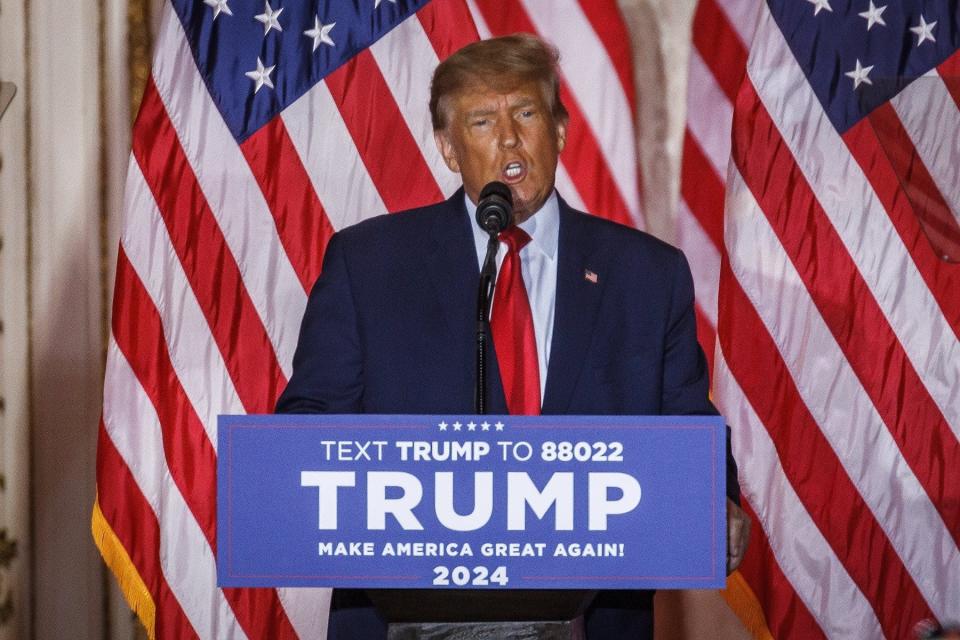No one wins: America's culture wars are a losing fight for Democrats and Republicans alike
American society is realigning in ways that show there is no ultimate victory for either the political left or the right in fighting over our most contentious social conflicts.
Republican losses in the midterm elections this month revealed the cool reception that far right social positions receive among many Americans, especially when prosecuting the culture war is the central thrust of a campaign.
That approach has been at the core of Donald Trump's style of politics for the past seven years. And it led in this month's elections to losses for many of Trump's acolytes, including House candidate Bo Hines in North Carolina, gubernatorial candidates Kari Lake in Arizona and Doug Mastriano in Pennsylvania, and Senate candidates Don Bolduc in New Hampshire and Blake Masters in Arizona.
Voters value competence over cultural fight
“How do we win races?” asked conservative commentator Ben Shapiro after the election returns came in. “Baseline levels of competence and then engage in the culture war issues, not the other way around. And also, don’t alienate everybody on earth with claims that the vast majority of Americans do not actually believe. You cannot make election 2020 the subject of your campaign in any major way in the United States and hope that things are going to turn out amazing unless your district is like a deep red district.”

The point that false stolen election claims are a political loser for Republicans is important. It's also important to understand that the lingering belief in some quarters that the 2020 election was stolen in a vast conspiracy of fraud is a culture war issue, and perhaps the central one.
The stolen election falsehood rests upon the assumption of deep corruption in the Democratic Party, much of the Republican Party and the major institutions of our democracy, including the courts and the news media.
Trust in legal system: Election law isn’t just a voting rights issue – it’s also a public safety issue
Even overwhelming evidence that President Joe Biden's election was in fact legitimate is rejected because many of Trump's supporters don't believe that the authorities (even Republican election officials) can be trusted.
The lack of trust in our public institutions is at the root of the voter fraud controversy. And that makes this issue a major front in the culture war.
Yet, as great a relief as the midterm results have proved to be for the Democratic Party, a close look at the data ought to generate cause for pause among progressives.
The credibility of the progressive social agenda rests in large part upon the perceived validity of its claim to represent the true interests and values of people of color in American society.
Cut the loser loose: Republicans need to give Trump the Hoover treatment
GOP gains among Black and Latino voters
But in an inversion of normal political reality, it largely was white voters who turned the red wave into a sputtering faucet for Republicans. Although they underperformed in the midterms in much of the country, Republicans improved their support this month among Black and Latino voters.
That also was true in 2020, when Trump outperformed previous Republican presidential candidates among Black and brown voters, even while losing overall.
Democrats have lost ground in two elections in a row in the percentage of votes from their core constituencies even while progressive activists try to further merge ethnic identity with political identity.
Perhaps more Black and Latino voters are splitting from Democrats because they do not share the culture war pieties of many activists on the left.
Opinions in your inbox: Get exclusive access to our columnists and the best of our columns every day
Former President Barack Obama addressed the issue in offering advice for his fellow Democrats in October.
"I think where we get into trouble sometimes is where we try to suggest that some groups are more – because they historically have been victimized more – that somehow they have a status that's different than other people and we're going around scolding folks if they don't use exactly the right phrase," Obama said in an episode of Pod Save America. "Or that identity politics becomes the principal lens through which we view our various political challenges."
Opinion alerts: Get columns from your favorite columnists + expert analysis on top issues, delivered straight to your device through the USA TODAY app. Don't have the app? Download it for free from your app store.
Comedian Dave Chappelle is highly controversial, including for comments about the transgender community. But he's also highly popular, including among Black Americans. And he could be the nation's best-known opponent of cancel culture.
“It shouldn’t be this scary to talk. About anything," Chappelle said in his opening monologue on "Saturday Night Live" following the midterms.
Comedian Gabriel Iglesias (aka “Fluffy”), perhaps America’s most popular Latino comedian, raised a similar point to a massive audience at Dodger Stadium in his recent Netflix special.
Speaking under a sign that read “Unity Through Laughter,” Fluffy said: “I understand that some people need to be held accountable but, ehh. And by the way, if I’m the one telling you about cancel culture, it’s already gone way too far. Because I pride myself in the fact that I’m not a comedian who’s divisive. That’s why I don’t talk about politics, religion or sports, because all three will divide people.”
Iglesias shared a personal story about how he was nearly “cancelled” after expressing his like for Chick-fil-A, making him complicit (in the eyes of some) in the company owner’s donations to charities that oppose LGBTQ rights.
Yet, the following for Chappelle and Iglesias has not diminished much, if at all, in the wake of these controversies.
In ways both social and political, Americans are finding ways to signal their resistance to a culture war that obstructs responsible governance on one side while the other side makes almost every personal interaction political.

Perhaps the way forward is for the great majority of us caught in the middle to insist on grappling with the complexity of most issues while demonstrating the willingness to disagree amicably whenever possible.
If that happens, then we will have gone from all of us losing the culture war to all of us winning it. For the better angels of our nature will have prevailed.
John Wood Jr. is a columnist for USA TODAY Opinion. He is national ambassador for Braver Angels, a former nominee for Congress, former vice chairman of the Republican Party of Los Angeles County, musical artist, and a noted writer and speaker on subjects including racial and political reconciliation. Follow him on Twitter: @JohnRWoodJr
More from John Wood Jr.:
Red and blue America don't trust each other. And that's driving us dangerously apart.
Dinesh D'Souza serves misinformation about 2020 election to gullible conservatives.
White privilege may be real, but economic class is a bigger factor in driving inequality.
You can read diverse opinions from our Board of Contributors and other writers on the Opinion front page, on Twitter @usatodayopinion and in our daily Opinion newsletter. To respond to a column, submit a comment to letters@usatoday.com.
This article originally appeared on USA TODAY: Trump's candidates lost, but liberals still have reason for worry

 Yahoo Movies
Yahoo Movies 
